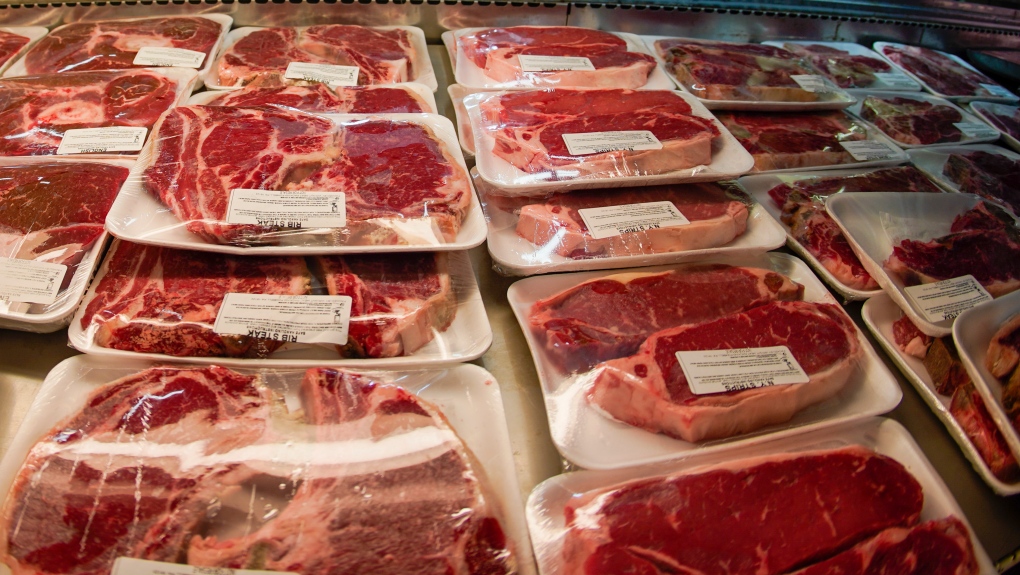Fresh food can be contaminated by sticker labels, Montreal study finds
 FILE - In this photo made on June 16, 2022, rows of fresh cut beef is in the coolers of the retail section at the Wight's Meat Packing facility in Fombell, Pa. (AP Photo/Keith Srakocic, File )
FILE - In this photo made on June 16, 2022, rows of fresh cut beef is in the coolers of the retail section at the Wight's Meat Packing facility in Fombell, Pa. (AP Photo/Keith Srakocic, File )
Fresh foods sold in Canada can be contaminated by a chemical found in sticker labels, according to a study led by a Montreal researcher.
Bisphenol S (BPS) is an alternative to bisphenol A (BPA), a chemical restricted in Canada because of its association with prostate and breast cancer. But BPS is also an endocrine disruptor, a chemical that mimics the effect of human hormones.
"With all the movement to get rid of bisphenol A in applications that are close to our food, to find the cousin bisphenol S in such high frequency everywhere like this, it really surprised us," said Professor Stéphane Bayen of McGill University's food science department.
Researchers analyzed a wide range of fresh packaged foods available in Canada, from meats and baked goods to cheeses and vegetables.
They found relatively high levels of BPS in labels and stickers printed via heat transfer. The amounts found were well above the European Union's limit.
In many cases, foods were contaminated by labels placed directly o them. But BPS even contaminated food covered with plastic film.
"We've shown that these thin films don't act as a barrier at all," said Bayen. "What's in the labels is going to get into the food."
In contrast, the team detected little to no BPS in plastic film, absorbent pads and plastic trays.
A 2020 U.S. study using mice showed BPS can cross the placental barrier and potentially interfere with a fetus' brain development.
Researchers documented a nearly 80 per cent reduction in the concentration of serotonin in the placenta and a three-to-five-fold increase in dopamine. Serotonin and dopamine are two neurotransmitters involved in brain development.
Canada does not regulate the use of BPS. However, Bill S-5, which would significantly modernize the Canadian Environmental Protection Act, proposes changes that various environmental groups have long awaited.
The act dictates how the federal government regulates toxic chemicals and other pollutants to protect the environment and people from harmful effects.
"The point we really want to push is to not make the same mistake again," said Bayen. "We replaced BPA with BPS, and now clearly we have a situation where we're going to have to find a substitute, and we really want to make sure that it's not substituted by something that in a few years is going to be on our radar again."
Protecting the population from BPA and BPS could involve favouring other types of materials for food packaging such as glass or metal.
The findings were published in the journal Environmental Science & Technology.
This report by The Canadian Press was first published in French on March 21, 2023.
CTVNews.ca Top Stories

B.C. tenants evicted for landlord's use after refusing large rent increase to take over neighbouring suite
Ashley Dickey and her mother rented part of the same Coquitlam duplex in three different decades under three different landlords.
Mountain guide dies after falling into a crevasse in Banff National Park
A man who fell into a crevasse while leading a backcountry ski group deep in the Canadian Rockies has died.
Expert warns of food consumption habits amid rising prices
A new survey by Dalhousie University's Agri-Food Analytics Lab asked Canadians about their food consumption habits amid rising prices.
MPP Sarah Jama asked to leave Ontario legislature for wearing keffiyeh
MPP Sarah Jama was asked to leave the Legislative Assembly of Ontario by House Speaker Ted Arnott on Thursday for wearing a keffiyeh, a garment which has been banned at Queen’s Park.
Charlie Woods, son of Tiger, shoots 81 in U.S. Open qualifier
Charlie Woods failed to advance in a U.S. Open local qualifying event Thursday, shooting a 9-over 81 at Legacy Golf & Tennis Club.
Ex-tabloid publisher testifies he scooped up possibly damaging tales to shield his old friend Trump
As Donald Trump was running for president in 2016, his old friend at the National Enquirer was scooping up potentially damaging stories about the candidate and paying out tens of thousands of dollars to keep them from the public eye.
Here's why provinces aren't following Saskatchewan's lead on the carbon tax home heating fight
After Prime Minister Justin Trudeau said the federal government would still send Canada Carbon Rebate cheques to Saskatchewan residents, despite Saskatchewan Premier Scott Moe's decision to stop collecting the carbon tax on natural gas or home heating, questions were raised about whether other provinces would follow suit. CTV News reached out across the country and here's what we found out.
Montreal actress calls Weinstein ruling 'discouraging' but not surprising
A Montreal actress, who has previously detailed incidents she had with disgraced Hollywood producer Harvey Weinstein, says a New York Court of Appeals decision overturning his 2020 rape conviction is 'discouraging' but not surprising.
Caleb Williams, Jayden Daniels and Drake Maye make it four NFL drafts with quarterbacks going 1-3
Caleb Williams is heading to the Windy City, aiming to become the franchise quarterback Chicago has sought for decades.

































